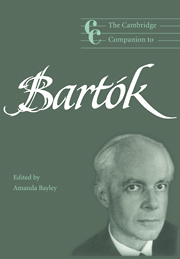Book contents
- Frontmatter
- Introduction
- Part I Contexts: political, social and cultural
- Part II Profiles of the music
- 3 Bartók's orchestral music and the modern world
- 4 The stage works: portraits of loneliness
- 5 Vocal music: inspiration and ideology
- 6 Piano music: teaching pieces and folksong arrangements
- 7 Piano music: recital repertoire and chamber music
- 8 The Piano Concertos and Sonata for Two Pianos and Percussion
- 9 Works for solo violin and the Viola Concerto
- 10 The String Quartets and works for chamber orchestra
- Part III Reception
- Notes
- Select bibliography
- Index
3 - Bartók's orchestral music and the modern world
from Part II - Profiles of the music
Published online by Cambridge University Press: 28 September 2011
- Frontmatter
- Introduction
- Part I Contexts: political, social and cultural
- Part II Profiles of the music
- 3 Bartók's orchestral music and the modern world
- 4 The stage works: portraits of loneliness
- 5 Vocal music: inspiration and ideology
- 6 Piano music: teaching pieces and folksong arrangements
- 7 Piano music: recital repertoire and chamber music
- 8 The Piano Concertos and Sonata for Two Pianos and Percussion
- 9 Works for solo violin and the Viola Concerto
- 10 The String Quartets and works for chamber orchestra
- Part III Reception
- Notes
- Select bibliography
- Index
Summary
In his essay, ‘Out of Hungary: Bartók, Modernism, and the Cultural Politics of Twentieth-Century Music’, Leon Botstein has argued that the composer ‘uniquely managed to reconcile the claims of formal musical modernism with the cultural politics of identity and subjective musical particularity’. While the music Bartók wrote between the end of the First World War and around 1930 does seem to be preoccupied with issues addressed by modernist composers such as Schoenberg (and the other members of the Second Viennese School), it should be noted that he could be sceptical, if not distinctly unsympathetic, towards some ‘revolutionary’ modernist artists. This can be discerned in his comments about Mondrian, Haba, Hauer and others in the first of a series of lectures given at Harvard University in 1943, where he considers the synchronic appearance of ‘revolutionary tendencies’ in all three branches of the arts. In Mondrian's case he grudgingly admits some public success, but he observes that ‘in literature there was less success, and in music no success at all’.
Although his response to a modernist artistic aesthetic may at times seem ambiguous or ambivalent, Bartók appears to have been a firm advocate and disciple of the ‘project of modernity’. Modernity, as characterized by Jonathan Rée, is concerned with an underlying epistemological contrast: ‘the modern world is enlightened, scientific, and disappointed, whereas its predecessor was superstitious, gullible and magical’.
- Type
- Chapter
- Information
- The Cambridge Companion to Bartók , pp. 43 - 61Publisher: Cambridge University PressPrint publication year: 2001
- 1
- Cited by



